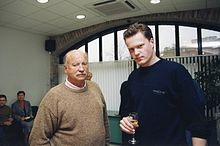Hellar Grabbi

Hellar Grabbi (born September 22, 1929 in Tallinn - † July 28, 2018 ) was an Estonian literary critic , writer and political journalist .
life and work
Hellar Grabbi was born as the elder son of the Estonian military Herbert Felix Grabbi (1896–1942). He fled to Germany in 1944 from the (second) Soviet occupation of Estonia . His father had been executed by the Soviets two years earlier. In 1949 he went to the United States . Grabbi graduated from Columbia University in 1959 .
From 1959 to 1967 Hellar Grabbi was employed at the Library of Congress in Washington, DC . From 1974 to 1992 he was employed by Radio Free Europe / Radio Liberty as editor and commentator for politics and culture. He was one of the most prominent voices in the Estonian community in exile in the USA.
From 1955 to 1964 Grabbi worked as a member of the editorial board of the Estonian exile magazine Vaba Eesti ("Free Estonia") and was from 1965 editor of the magazine Mana ("Magic"), which appeared in Toronto . From 1965 to 1999 he presented Estonian literature in the magazine Books Abroad / World Literature Today , whose editor-in-chief was the most exile Ivar Ivask . Grabbi has published the works of numerous Estonian writers abroad.
Hellar Grabbi was the author of numerous articles on contemporary politics and culture in Eastern Europe. Among other things, he translated Milovan Đilas ' The New Class. An analysis of the communist system in Estonian .
Private life
Hellar Grabbi was married to Irja Grabbi (née Napp ). The couple had two sons.
Books by Hellar Grabbi (selection)
- Vabal hääl. Mõtteid kahesajast eesti raamatust. (1997)
- Tulgu uus taevas. Mõtteid viiekümnest kirjanikust. (1999)
- Eestlaste maa (2004)
- Vabariigi laps (memoir, 2008)
Web links
- Interview with Hellar Grabbi ( Sirp , September 18, 2009)
Individual evidence
- ↑ Suri kirjanik Hellar Grabbi. In: ohtuleht.ee. July 29, 2018, Retrieved July 30, 2018 (Estonian).
- ↑ Eesti elulood. Tallinn: Eesti entsüklopeediakirjastus 2000 (= Eesti entsüklopeedia 14) ISBN 9985-70-064-3 , p. 69
| personal data | |
|---|---|
| SURNAME | Grabbi, Hellar |
| ALTERNATIVE NAMES | Põder, Kalju; Rand, Toomas |
| BRIEF DESCRIPTION | Estonian literary critic, writer and journalist |
| DATE OF BIRTH | September 22, 1929 |
| PLACE OF BIRTH | Tallinn , Estonia |
| DATE OF DEATH | 28th July 2018 |